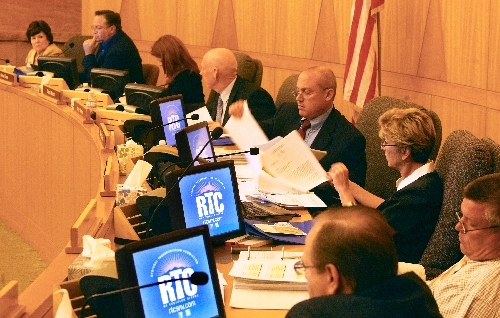First Transit holds on to bus contract
Government-issued transportation contracts traditionally are straight-forward: The company that offers to provide the service at the lowest price lands the job.
As many have witnessed during the past month, when the contract is worth $600 million over seven years -- the largest public transit agreement in the nation -- strange things happen. Or in Thursday's case, nothing happens.
The Regional Transportation Commission made three attempts to decide how to handle Veolia Transportation's formal protest over the board's May 19 decision to take the contract away from Veolia and award it to First Transit, whose bid was $50 million less over the seven-year period. Each attempt failed because of vote counts, leaving First Transit with the contract -- for now.
Commissioners agreed to seek an opinion from the state attorney general to determine whether they had a sufficient quorum during the 4-3 May vote in favor of First Transit.
Regardless of the opinion, board members anticipate that either First Transit or Veolia will file a lawsuit.
"As far as I'm concerned, the contract is theirs (First Transit's), and we can save taxpayers $7 million a year," First Transit consultant Terry Murphy said after the meeting.
Veolia Transportation officials contend that a state law passed in 2001 states that a majority vote must be based on the number of commissioners on the board, whether or not they are present at the meeting. If that were the case, the commission needed five votes to give First Transit the contract. Commissioner Lois Tarkanian was absent from the May meeting, leaving only seven members.
Kent Woodman, an attorney representing the Regional Transportation Commission, said that when the 2001 bill was passed, more than 100 public agencies that had to abide by the new law were listed. The Transportation Commission was not one of them.
Woodman called that claim, with about 19 others filed by Veolia, meritless and criticized attorneys for Veolia for their "attacks on staff and attacks on the competitors."
The second significant claim was the weight of scoring given to technical issues and pricing. Jane Sutter Starke, another outside attorney hired by the commission, said Veolia should have filed a complaint about the scoring five days before submitting its proposal. She noted that the weighting was listed in the request for proposals.
Starke told commissioners they could consider adjustments in future bidding processes, but the current document "cannot be changed to suit Veolia's interests."
The atmosphere during the four-hour hearing felt more like a court hearing, with attorneys making their pleas and leaping out of their chairs to object to other lawyers' remarks. Larry Brown, chairman of the board, reminded both sides that it was not a court proceeding but hinted strongly that the issue will end up in a courtroom.
Attorney Pete Gibson, representing First Transit, told board members , "This commission is not a court, not a legislative body. As such, we believe you are bound by the legal advice given to you by your lawyers. They are, in fact, lawyers for the public."
Henderson City Councilwoman Debra March, North Las Vegas Councilman Robert Eliason, Boulder City Mayor Roger Tobler and Mesquite City Councilman David Bennett, the four commissioners who voted in favor of First Transit in May, followed the attorney's advice and rejected the merits of Veolia's protest.
Clark County Commissioners Chris Guinchigliani and Brown with Las Vegas City Council member Steve Ross voted to accept the protest. Tarkanian abstained from voting on all of the merits except the 4-3 vote claim.
Brown said that despite costing more money, Veolia had his vote because he is a loyal person, and the company had fulfilled its obligations for years.
Ross sided with Veolia and asked that the process be redone, saying he could not believe that such a great discrepancy could exist between the two bids.
"We are trying to provide the best service at the best price to the people in this valley," Ross said.
Bennett questioned Ross' reasoning, asking Regional Transportation Commission General Manager Jacob Snow whether the agency has received such differing bids on other major projects.
Snow said bid differences can be greater than the 8 percent between the two transit corporations, adding, "We are very well established in our pattern."
A second agenda item that would have allowed the board to move forward with reconsideration of the May 19 vote failed because the motion must be made by a member who voted in favor of First Transit. No member was willing to make the request.
The third contract-related item on the agenda was to reconsider the contract vote. Because no action was taken on the protest and affirmative-voting board members did not make a motion to reconsider, that item was deemed moot.
Brown said he didn't sign the contract after the May 19 vote because of concerns about the legality of the quorum.
Whether he will sign the document if the attorney general deems the vote lawful remains to be seen.
The matter could end up in court, and litigation could continue well beyond September when Veolia's contract expires and First Transit is expected to take over.
Contact reporter Adrienne Packer at apacker@reviewjournal.com or 702-387-2904.






















